The smell of fresh rolls
It is 8 o'clock in the morning and I am standing in the Old town bakery Finkenauer in Ober-Ingelheim. There is a wonderful smell of freshly baked bread, rolls and sweet pastries. Even the first glance at the display shows that real bakery work is still being done here. Huge loaves of bread lie on the shelves. The baskets underneath and in the counter are filled with still warm rolls and the cake makes my mouth water. It's the kind of bakery I remember from my childhood, with friendly staff who mostly know the customers personally and where chatting over the counter is part of the job.
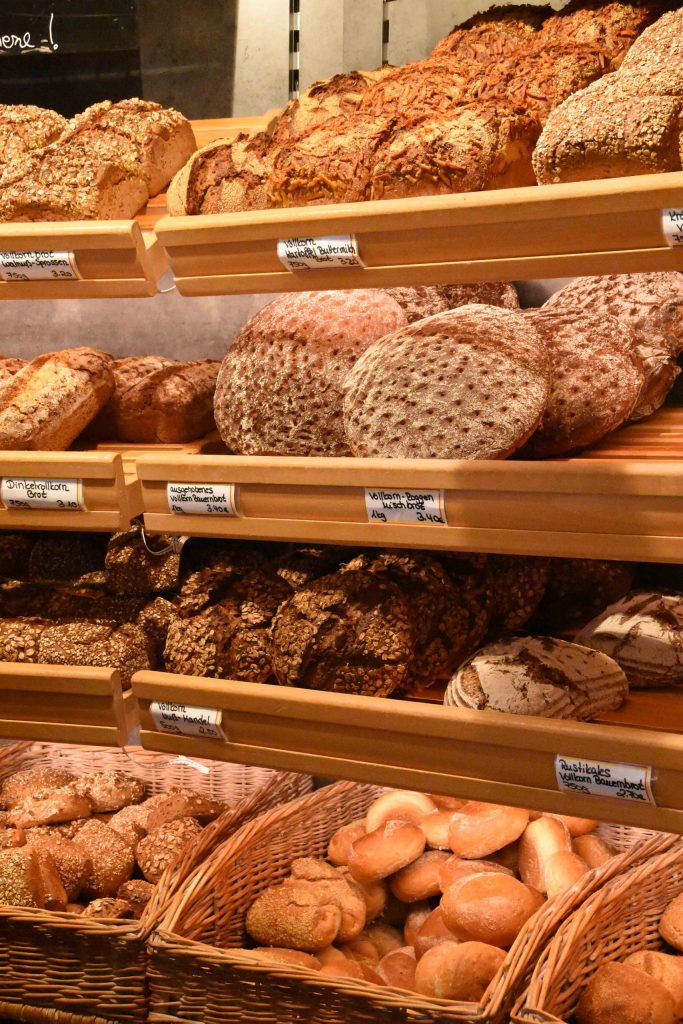
View into the bakery
I meet Frank Finkenauer. He took over the bakery from his from his father, but the bakery trade has been in the family for around 160 years. years in the family. Founded in 1861 in Kriegsfeld in the Rhineland-Palatinate, the small bakery store on the corner came to Ingelheim in 1971. Baking has been going on here ever since, traditional recipes and techniques that have been passed down from generation to generation. passed down from generation to generation.
I am allowed to look around the bakery, have the contents of numerous bowls explained to me and am fascinated by the details that the trained baker and confectioner tells me about the baking craft. Preservatives, ready-made mixes or even ready-made dough (not uncommon in today's bakeries) don't go into the roll bag here. Instead, he mixes each flour and grain blend himself, prepares doughs so they have time to mature, and finally bakes them fresh for sale. It's a time-consuming method, but the result is worth it.
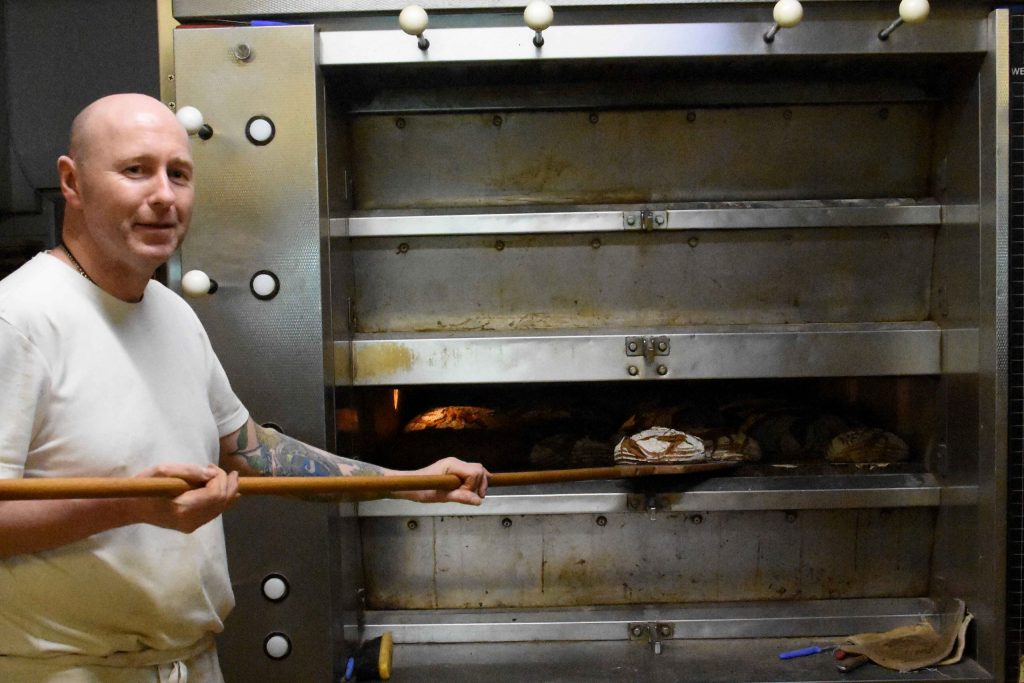
Frank Finkenauer hands me his bread calendar. A DIN A4 sheet with all the types of bread he has on offer. From the classic mixed rye bread to the Chia original grain bread, everything is there. As he says in conversation he would like to try out a lot more and create new things, but he doesn't have the time time for that in his work schedule. Just recently, he switched all of his products to wholemeal flour. a bit of a gamble, but it has been well received by his customers.
Passion and idealism
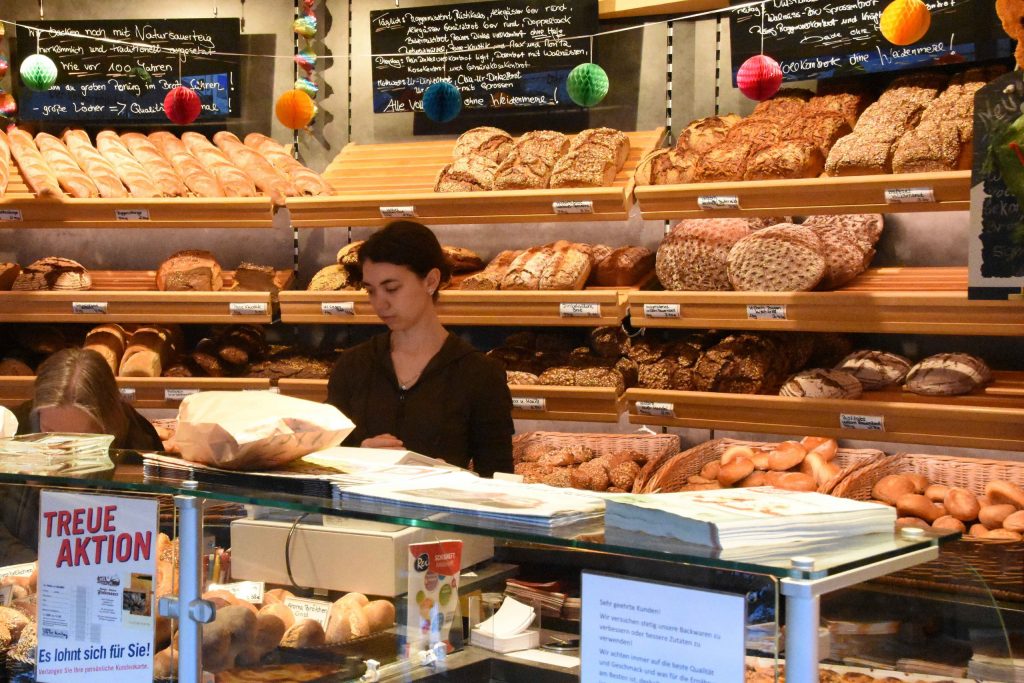
I can feel the passion for his work. With love and justified pride, he tells me about his breads and specialties, such as the the crispbread assortment, and yet there is also a little sadness in his voice in his voice when he reflects on the current working conditions of his guild. of his trade. Lower and lower prices, less and less appreciation for good quality, and a uniform taste due to numerous additives is making manufacturers who still attach importance to high-quality raw materials and ingredients. life is not easy.
With a delicious red wine bread under my arm and the great hope that such passionate bakers will continue to exist for a long time to come, I step out of the shop door. the store door.
The lemonade sommelier
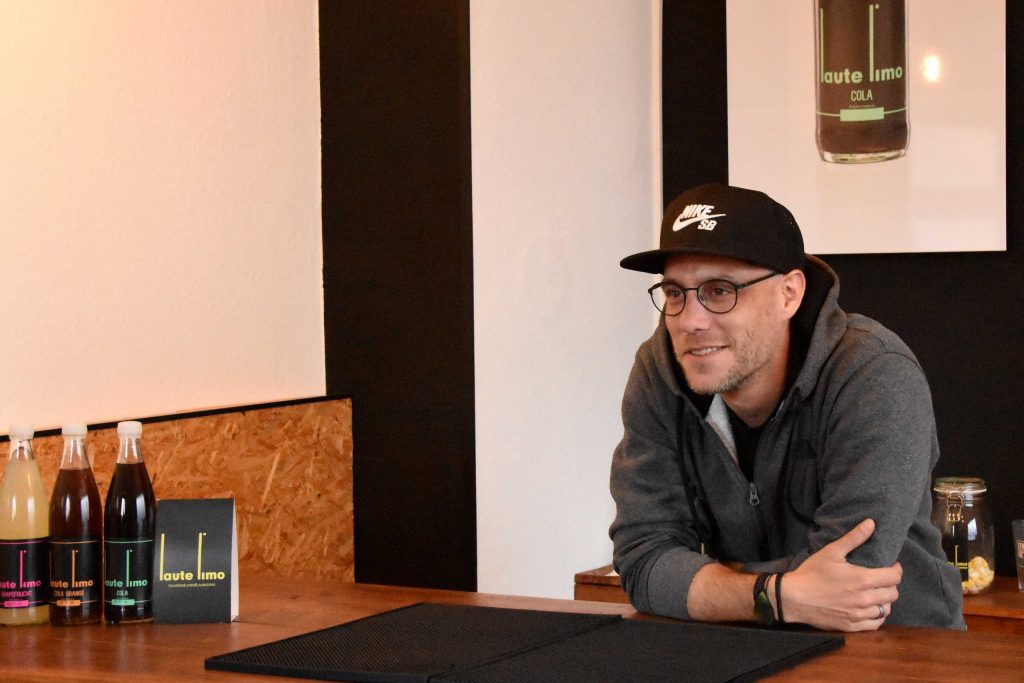
In the Herrnsheim district of Worms, Paul Weißbach, founder of the lemonade factory, is waiting for me. Loud soda. Wearing a sweat jacket and baseball cap, he stands behind the counter of his kiosk, a small store in a nondescript backyard. Even before our conversation really begins, I have a glass in front of me and am spoiled for choice between five different flavors of refreshing lemonade: Cola, Cola-Orange, Orange, Lemon and Grapefruit. I spontaneously decide on grapefruit and the first lemonade tasting of my life begins.
Soda in wine glass
While I let the lemonade tingle on my tongue, Paul Weißbach tells me how the idea for his lemonade project was born. was born. "Actually," begins Weißbach, who works part-time with the DJ collective Komma Laut, "it was simply supposed to be an event drink for events at which we play. where we DJ." Confidently, he thought that it couldn't be that so difficult to make his own lemonade. But he soon soon discovered that the first hurdle was finding a bottling plant. bottling plant. "The usual bottling volumes are around a million liters. liters. That's when most people laughed at our idea," says Weißbach. looking back.
When a bottling company from the region finally agreed, the actual work could finally begin. Now the task was to find the right recipe. More fruit, less sugar, and the right amount of carbon dioxide - the basic idea was quickly established, and the finer points developed step by step.
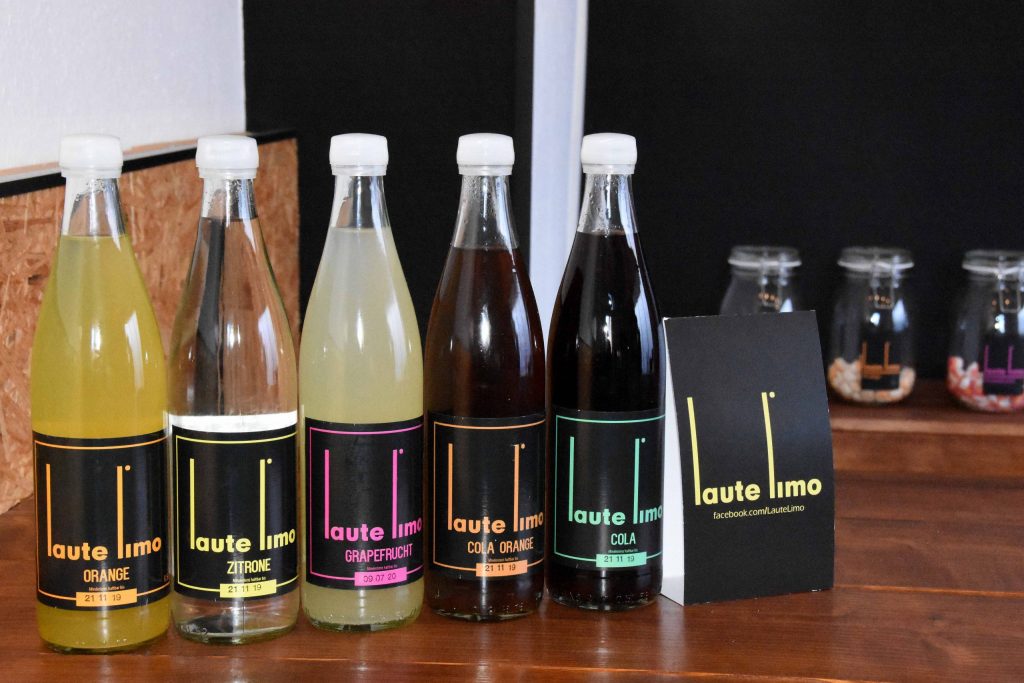
My glass of grapefruit lemonade is empty by now and I'm looking forward to cola, one of the first three flavors that went on the market in 2013. "Cola was a must and a challenge at the same time, because everyone knows the classic taste of cola," the social pedagogue tells me, and even now I can sense the enthusiasm in his voice when he talks about the moment of his first perfect "Lute Limo Cola." It's a lengthy process, a constant tasting, adding and taking away sugar or carbonation until the right taste is found. He always takes samples in a wine glass, because that's the only way for their proper taste to unfold.
"oldschool" instead of trendy
Paul Weißbach didn't want to develop a trendy product with his lemonades, but rather a classic drink - perhaps even a bit "oldschool". But he is also concerned with improving the bad reputation of lemonade. "Lemonade can do more than you think, and it's honest," he says as I sample "Loud Lemonade." "Everyone knows it contains sugar, after all, and can and should use it in moderation accordingly." Still, his sodas are as natural as possible, with little sugar, no artificial colors and all-natural flavors.

The distribution of the small lemonade manufactory runs entirely through Paul Weißbach alone. He himself supplies cafés and bars within a radius of 100 km, and he's picky about it, because his soda "needs a good home," as he says. Otherwise, his small kiosk is open every Saturday. Down-to-earth, straightforward without a lot of frills - that's Laute Limo. But above all but one thing above all: delicious!
A life for the Noodle
Just a few suburbs away, in Worms-Horchheim, Elli and Theo Heyne await me in their farm store. For 20 years they have dedicated their lives to the noodle. "Börschinger's noodles" is the name of the small manufactory, which was founded in 1988 by Elli Heyne's father and is now run by the second generation.
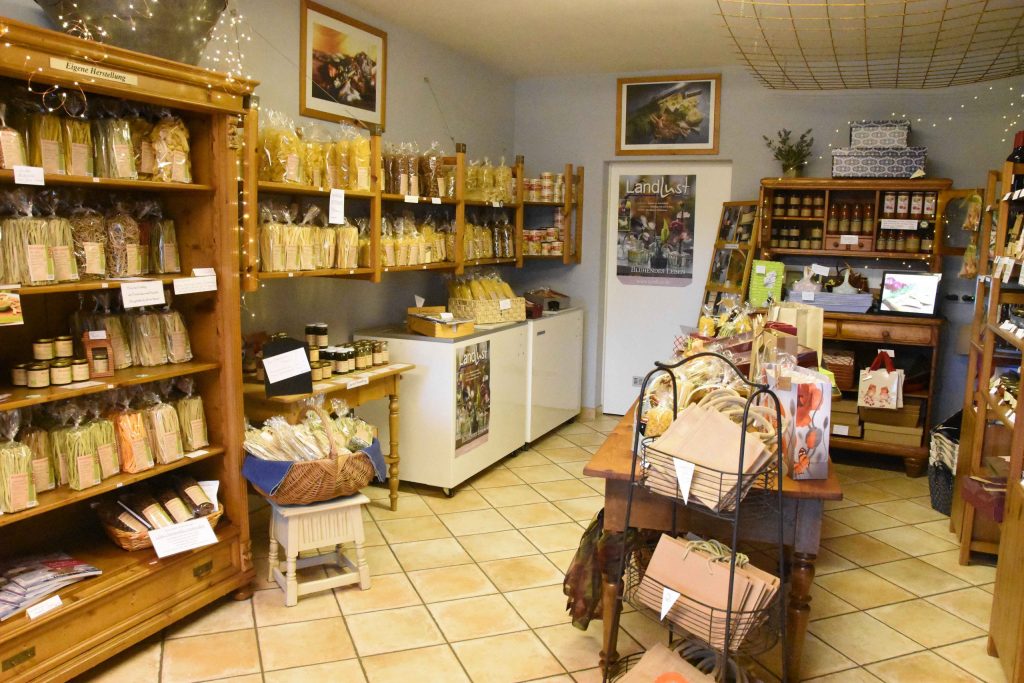
It was not the passion for noodles that prompted the founding back then, but a surplus of eggs in the family farm that had to be used sensibly. Pragmatism instead of passion, things look different for Mr. and Mrs. Heyne today. As soon as I enter the small store, I can feel the heart and soul that goes into every single product. Numerous packages of different types of pasta are lovingly draped on the shelves, in between pestos and chutneys - also homemade.
A long drying time is the key
Elli Heyne is responsible for the store and distribution, her husband husband Theo for production. Three days a week, sometimes until late into the night, he night, he stands at the pasta machine, taking in layer after layer of pasta and carefully places them on the trays ready for drying. "30 hours of gentle drying results in an extremely tasty and firm-to-the-bite noodle," the noodles," explains the trained carpenter, who swapped wood for dough 20 years ago 20 years ago and seems very happy about it. "It was not a long-planned into the noodle business, but rather a decision based on the situation," Theo tells me. out of the situation," Theo Heyne tells me, "but I had a great desire to turn Börschinger's noodles something special".
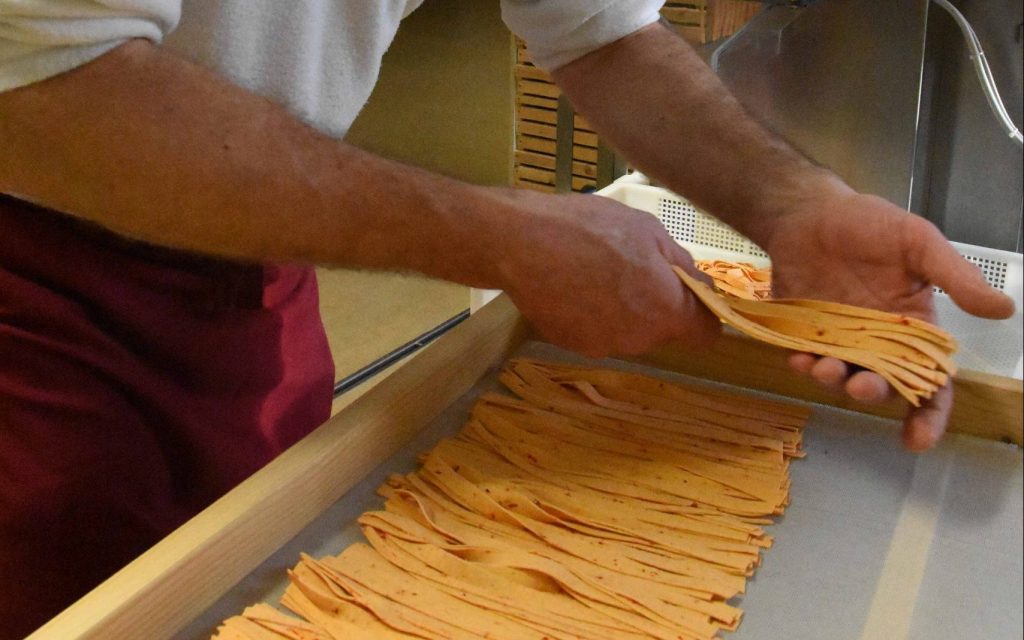
Pasta for every taste
He has succeeded in this, because the manufactory now has up to 80 different types of pasta in its range - both conventional and certified organic. It goes without saying that he attaches great importance to the best quality raw materials. Always fresh eggs from an organic farm in the Palatinate and a first-class durum wheat semolina are the basis of the Börschinger noodles, but to this basis something important is added: creativity and the joy of experimenting.
Of course, there are the classic pressed ribbon noodles, spirellis or spaghettis, but there is also a variety of very own creations, such as rolled noodles with hemp, spinach or walnut and - not to forget - freshly prepared mule thimbles. And even for vegans, the manufactory has noodles without eggs on offer.
Every pasta wish is fulfilled here
"Until a year ago, I still stood at weekly markets myself and sold our pasta there for 19 years," recalls Theo Heyne with some nostalgia. Today, the importance of weekly markets has declined significantly; only at farmers' markets are the Heynes still represented with a sales stand. However, over the years, another line of business has developed: contract pasta made especially for customers. Whether it's vintners who want their exact wine incorporated into the noodle or companies looking for a very special employee gift, Börschingers Nudeln can fulfill almost any noodle wish.
I look around again in the small store and discover under almost every variety a specially for this noodle matching recipe. Just reading it makes my mouth water and I see a smile flit across Elli Heyne's face - she knows that her love of pasta detail resonates with customers. So it's no surprise that Börschinger's noodles are now known far beyond the city and state borders. The family business ships its products all over Germany.
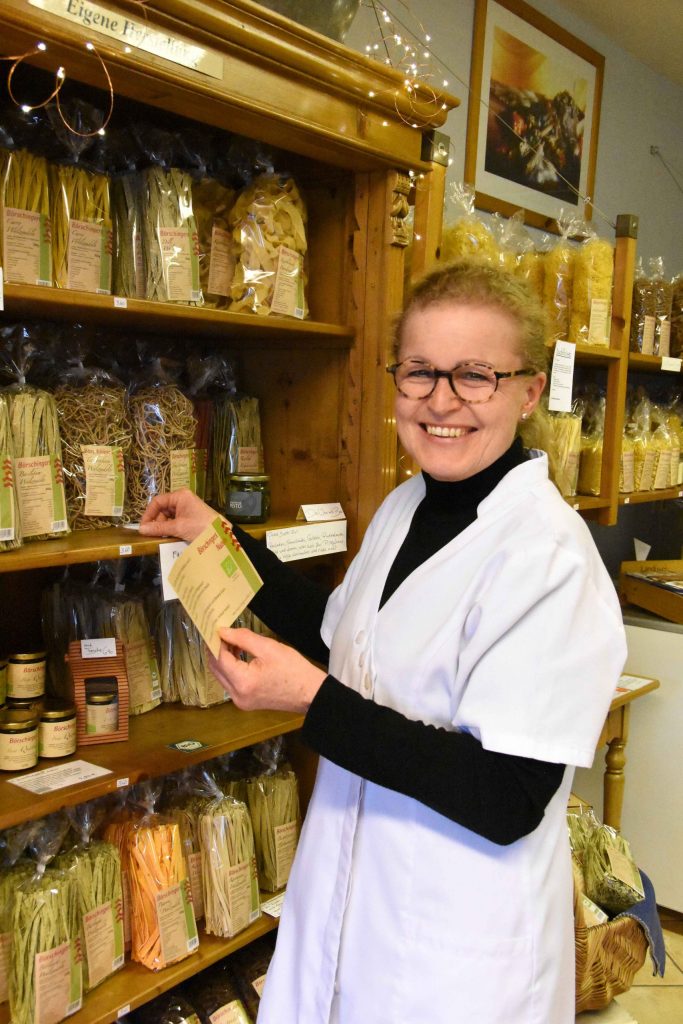
When I leave the farm store after a good two hours with three noodles and a lot of new knowledge, I know what I'm going to cook tomorrow. cook tomorrow.
Sweet seduction
My last visit takes me to Schwabenheim in Nina's chocolates manufactory. The small store is well hidden in a backyard, but a sign with delicious chocolates on the yard gate shows me the way.
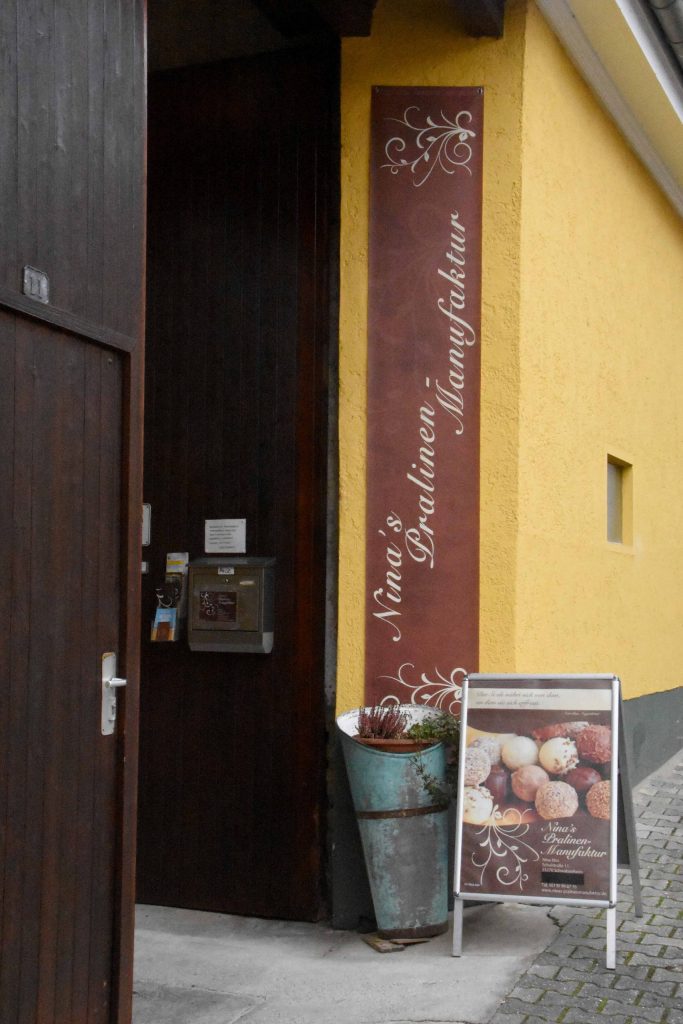
Nina Klos is the name of the owner who has been producing top-quality sweet temptations here since 2011. Pralines, truffles and chocolate bars - the trained baker and confectioner discovered her love for these little delicacies early on. "I was very lucky to be able to work with chocolate during my training as a confectioner," Nina Klos tells me as I look at the delicious display. "Pure chocolate is a very high-quality raw material and therefore not a daily business, even in pastry shops. During my work, I immediately fell in love with this great product."
Only the best raw materials
That this passion continues to this day, I notice immediately in our conversation. Expertly and lovingly at the same time, she explains to me how the individual chocolates and truffles are made. Whether yolked, rolled, coated or smooth, each of the little sweets is made and decorated according to her own recipe and by hand. The chocolate bars poured by hand and refined with nuts, berries or spices.
It goes without saying that Nina Klos uses only the best raw materials - fairtrade and certified organic - for her products. "The origin of my raw materials is very important to me, because I want to take responsibility for the environment and at the same time also ensure better social conditions in the countries of origin of the cocoa beans. That's why I've been working with a company in Peru since the beginning."
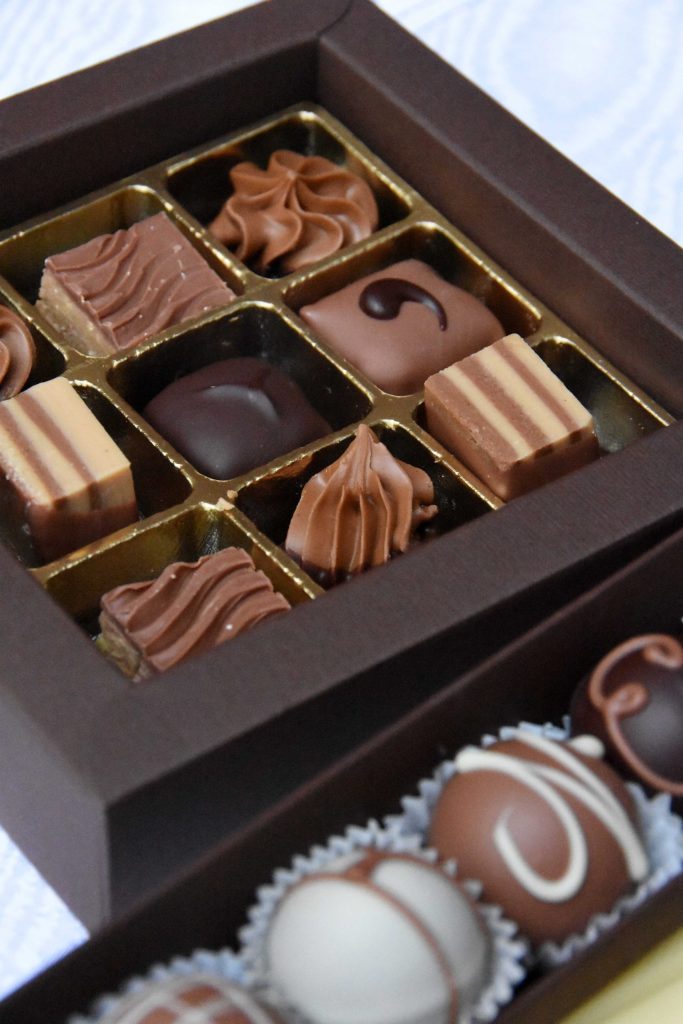
Nina's matter of the heart
Nina Klos sells her chocolates, truffles and chocolates at art, farmers' and craft markets, and on Thursdays from 2 to 6 p.m. also in her small store in Schwabenheim. She always has 30 varieties on offer, plus fine chocolates in bar form or also elaborately molded into various figures - often entirely according to customer wishes. "Whether for birth celebrations, company anniversaries or other occasions, I often get orders to design my own chocolate creations," the master chocolatier tells me. "Even vintners who bring over their own wine and want to have a matching praline created from it are among my customers."
It is a varied and very creative work, genuine craftsmanship with a lot of passion. The fact that chocolate is her heart's is not only written in her flyer, but by entering Nina's Pralinenmanufaktur it is noticeable. Before I leave the small store, I put together a small bag of my favorite chocolates and with my favorite chocolates together and leave full of anticipation of the sweet sweet pleasure the small store.

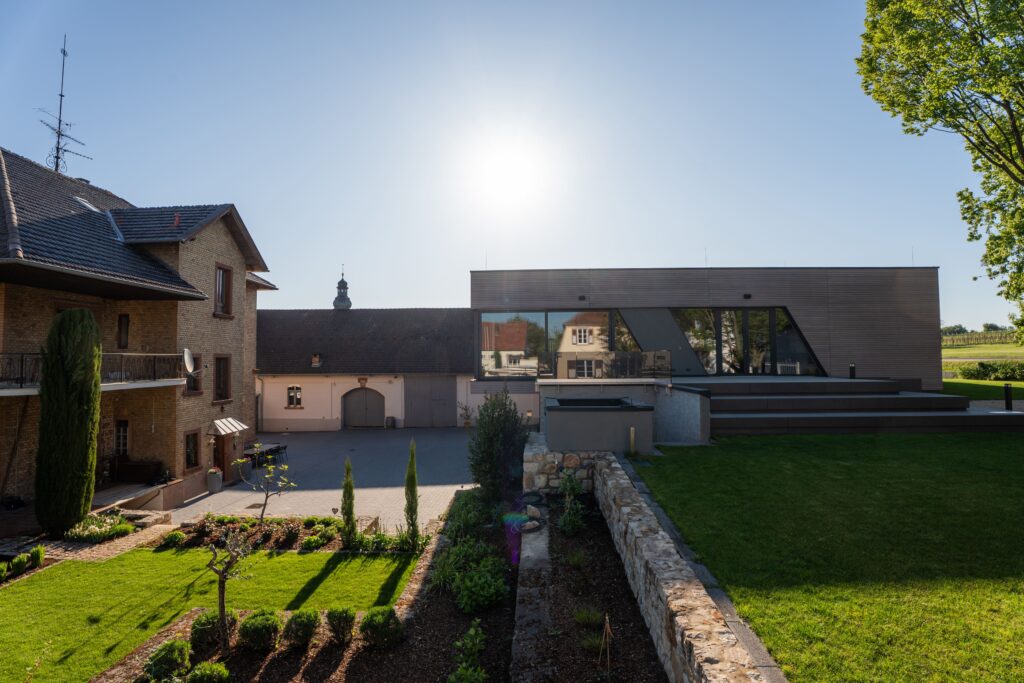
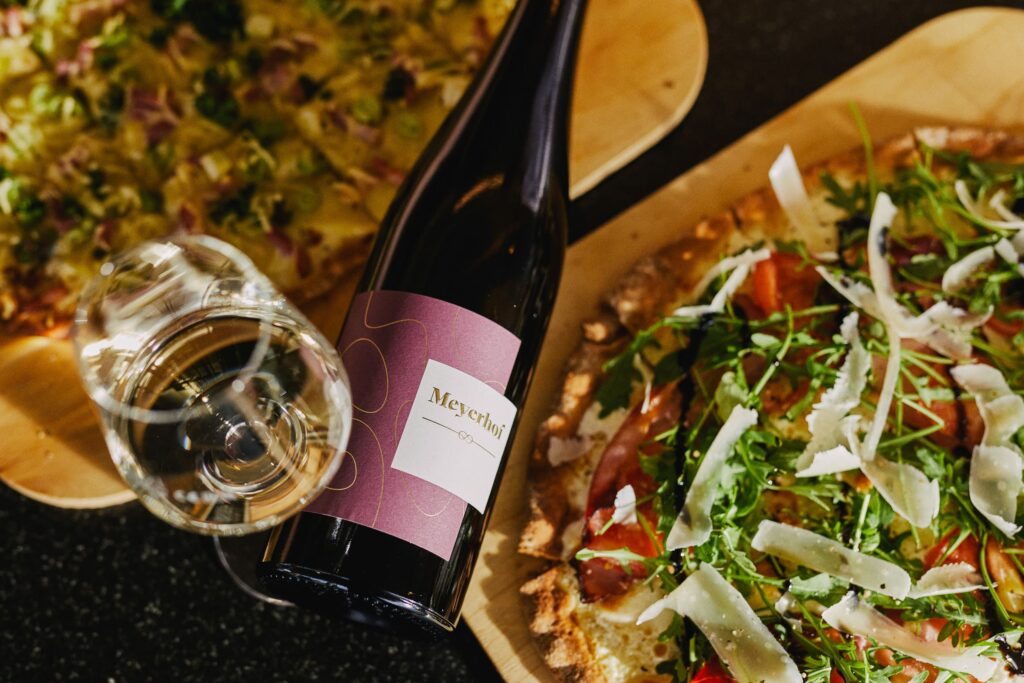
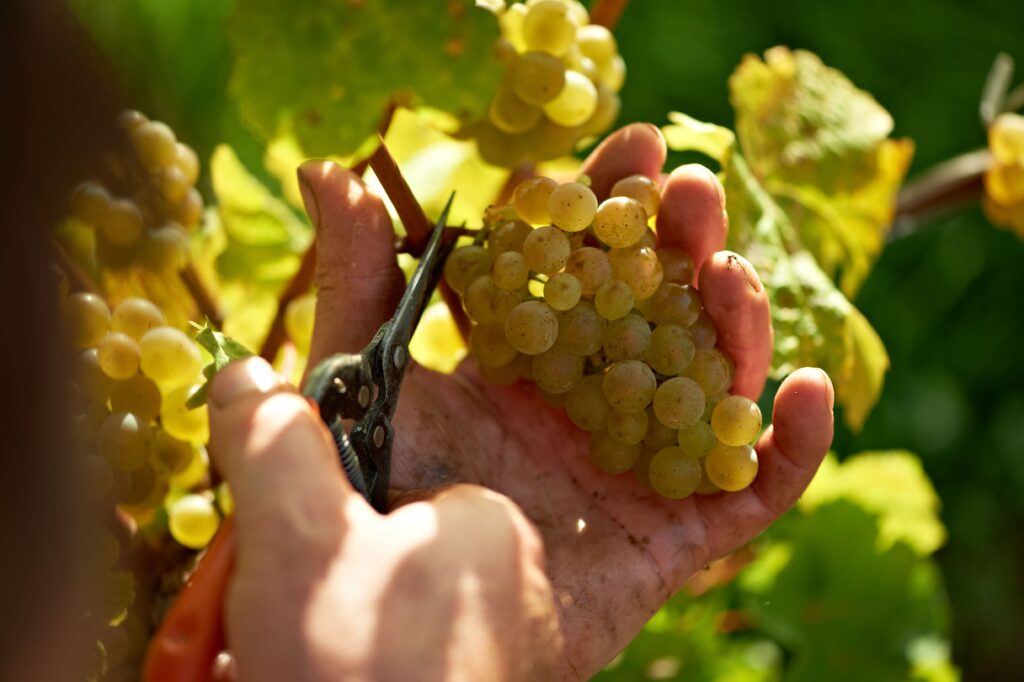
2 Responses
Hallole,
besides your visit to Börschinger's Nudeln of Elli and Theo Heyne (we like to buy) you could have visited just around the corner in the Turnhallenstraße in Worms - Horchheim also a small and fine chocolaterie, namely the "Horchheimer Scheune" of Tanja Emler - Rupp. But you already had a small chocolate shop in Schwabenheim in your selection. Perhaps you think the next or the next but one time to this presentable little chocolate shop - Mrs. Emler-Rupp is there with heart and soul.
The bicycle club ADFC Worms, for example, celebrates its annual Christmas party here for up to 30 people in a breathtakingly beautiful ambience.
Kind regards - Dieter Dohmeier, Alb.-Schweitzer-Str. 52, 67549 Worms-Leiselheim
Dear Mr. Dohmeier,
thank you for your reference to the "Horchheimer Scheune". In fact, I also discovered it during my visit to Börschinger's Noodles. I keep them very gladly in the back of my mind, if I ever work on a similar topic again.
Kind regards